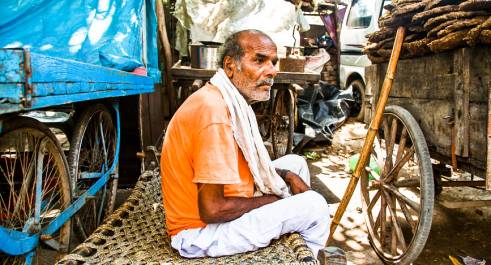
COVID-19 is likely to have a particularly significant direct and indirect impact on older people in poverty living in informal settlements – slums, shanty towns and favela communities.
Informal settlements are the result of rapid and poorly managed urbanisation, rarely have sufficient services and are routinely neglected and their residents stigmatised. Multi-generational households, cramped living conditions and a lack of basic services such as clean water, mean control measures such as hand washing and self-isolation are less effective1, and often impossible.
Older people have high rates of existing medical conditions and often live in poverty. Many are homeless and destitute. Older people are particularly at risk of serious illness and death2 from COVID-19 as well as suffering from the socio-economic impact of the restrictions imposed to control the virus.
There are likely to be higher rates of direct and excess mortality as a result.
Local community level organisations must be involved, and each individual community should have its specific needs assessed. Governments must ensure adequate medical services are made available in these communities, recognising the increased risk and absence of existing services. Response activities should ensure the inclusion of older people who are particularly excluded as well as provide additional support to mitigate against the significant indirect social and economic consequences of COVID-19.
HelpAge is calling for examples of COVID-19 responses in informal settlements to share amongst its network of members.
Why are older people in informal settlements at risk?
Control measures are less effective
Many of the measures being implemented to control the spread of COVID-19 are likely to be less effective in informal settlements. Older people often live in inter-generational households crammed into small spaces and buildings making social distancing and self-isolation largely impossible. Poor sanitation infrastructure and the absence of clean running water makes hand washing difficult. Poor or non-existent health services mean testing and case tracking will likely be more complex.
Simply informing residents to practice these measures is insufficient and the number of cases in informal settlements will be under-estimated.
High rates of existing medical conditions
Poverty, poor sanitation and pollution in informal communities mean residents and particularly older people, suffer high rates of non-communicable respiratory diseases3. The absence of health services means many older people are likely to have undiagnosed and untreated existing medical conditions. These conditions include asthma, tuberculosis and chronic obstructive pulmonary disease (COPD), placing older residents at greater risk from COVID-19.
Precarious incomes and disrupted
Older people and their families in informal settlements have low and precarious incomes that are being significantly disrupted during the crisis and often have no savings. Older people are vulnerable to poverty, hunger and destitution as an indirect consequence of the response and restrictions to slow the spread of COVID-19. Most households are unable to stockpile food and medicines in preparation for long periods of isolation. Working from home is often not an option and many will understandably try to continue earning an income.
Homelessness and destitution
Informal settlements are home to high numbers of homeless and destitute people who are particularly vulnerable to the direct and indirect consequences of COVID-19, including many in older age. They suffer high rates of pre-existing medical conditions, have no residence to isolate themselves within, and often have no access to medicines, supplies or health services.
What actions can be taken? .
1. Multi-stakeholder responses
Public, private and non-governmental partners must work together to deliver joint community responses that build on existing capacity and infrastructure. All stakeholders should include organisations and representatives from poor and informal communities, including those that support older people, and who are best placed to identify and address gaps in service provision and outreach.
2. Basic needs assessments
A basic needs assessment in each community must be carried out, appreciating the diversity of the urban context of different communities so that public health measures can be tailored and adapted, avoiding overly simplistic one-size-fits-all city-wide policies.
3. Adequate medical resources
Medical services and resources – equipment and staff – must be made available in informal communities where the population is at greater risk, control measures such as handwashing and social distancing are likely to prove less effective, and existing health services are inadequate or non-existent.
4. Inclusive response activities
Activities targeted at older residents who may live in isolation, have disabilities or have undocumented status and are excluded from standard response activities are required to ensure no one is left behind.
5. Socioeconomic mitigation
The indirect social and economic consequences of COVID-19 should be addressed with income support schemes as livelihoods are disrupted, continued supply and access to vital medications, protection for residents at increased risk of violence and abuse and measures to mitigate social isolation and loneliness.
6. Public communication
A positive case for the need to invest resources to respond to COVID-19 in informal settlements is required to secure political and public support. Investing in the response in these areas not only protects the most at risk but also reduces the risk for the overall urban population by tackling the virus in potential hotspots.
HelpAge
Personas mayores y COVID-19 en asentamientos informales (Spanish)
1 Adiga A et al. ‘Disparities in spread and control of influenza in slums of Delhi’, The BMJ, 8:1 2018
2 Fei Zhou MD et al. ‘Clinical course and risk factors for mortality of adult inpatients with COVID-19 in Wuhan’, The Lancet, 395:10229 2020
3 Checkley W et al. ‘Managing threats to respiratory health in urban slums’, The Lancet, 4:11 2016
